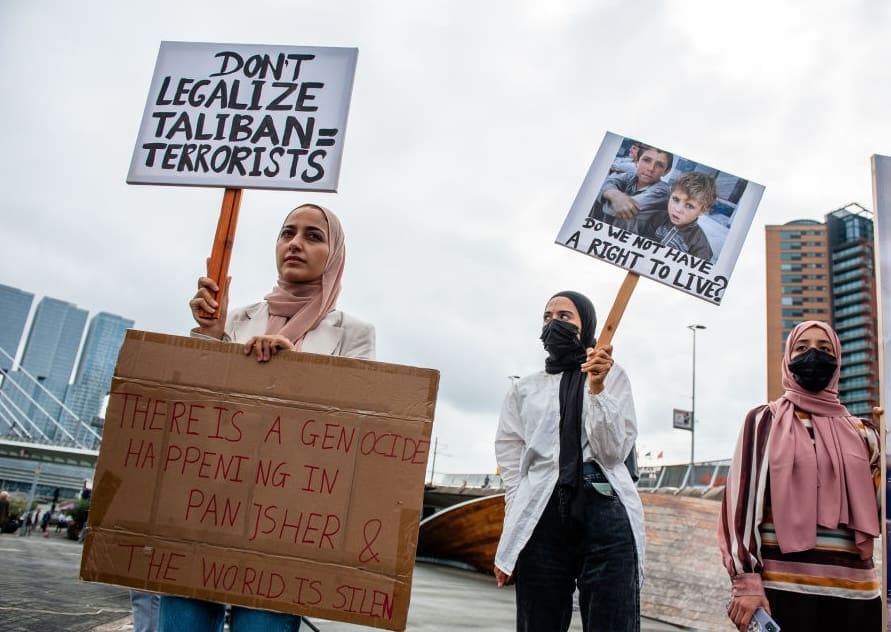
DeepMind’s 145-page paper on AGI safety may not convince skeptics
April 9, 2025
This former influencer gave up her smartphone. She says you should, too
April 9, 2025The Trump administration’s dealings with the Taliban reveal a dangerous willingness to overlook gender apartheid.
A new phase in U.S.-Taliban relations appears to be quietly unfolding under the Trump administration—marked by lifted bounties on senior Taliban officials, a symbolic embassy cleanup in Kabul, and the release of an American hostage. While these developments are being framed as constructive steps toward diplomacy, they also reveal a stark reality: The future of U.S.-Taliban engagement may be transactional, and Afghan women and girls are likely to be left out of the equation.
Late last month, the U.S. government removed bounties on three senior figures in the Taliban’s powerful Haqqani network—Sirajuddin Haqqani, Abdul Aziz Haqqani and Yahya Haqqani. Sirajuddin Haqqani, the group’s acting interior minister, has been linked to numerous deadly attacks against Western targets, including a 2008 bombing at the Serena Hotel in Kabul that killed a U.S. citizen. Though still listed on the FBI’s wanted page, he no longer appears on the State Department’s Rewards for Justice site.
For the Taliban, the move is a clear win. According to Foreign Ministry official Zakir Jalaly, it signals that both sides are “moving beyond the effects of the wartime phase and taking constructive steps to pave the way for progress.” But progress for whom?
The Taliban has consistently enforced draconian restrictions on women and girls since reclaiming power in August 2021. Bans on education, employment and freedom of movement have made Afghanistan one of the world’s most repressive places for women. And yet, none of the recent diplomatic overtures from the U.S. appear to have made the rights of Afghan women a priority—or even a condition.
Analysts warn that this is the consequence of a relationship now defined by transactional diplomacy. “The removal of the bounties was a win for Taliban officials wanting to do business with the international community,” said Ibraheem Bahiss of International Crisis Group. He added that the U.S. was showing it could reward those who make compromises “within their own remit,” even if those gestures don’t reflect national policy changes.
This silence is not just symbolic—it is substantive. The U.S. response, particularly under Trump, shows no indication that women’s rights will be a central issue in negotiations.
Indeed, Bahiss points out that international actors have demanded that the Taliban lift restrictions on women and girls—but offered nothing in return. “Scrapping bounties,” he said, “was a sign that small diplomatic overtures were possible.” For the Taliban, what matters more than formal recognition is relief from sanctions, which inhibit their ability to travel and conduct business. “The transactional nature of this diplomacy suits both the Taliban and Trump.”
The same week the bounties were lifted, Taliban officials repainted the outer walls of the former U.S. embassy in Kabul, removing anti-American slogans and religious inscriptions ahead of a visit from a high-level U.S. delegation. This small but symbolic act coincided with the first official U.S. diplomatic visit to Taliban-controlled Afghanistan since 2021, led by special presidential envoy Adam Boehler and former ambassador Zalmay Khalilzad.
During the visit, the Taliban released George Glezmann, an American Delta Air Lines mechanic who had been detained since 2022 without charges. The Trump administration credited the breakthrough to diplomacy with support from Qatar. The Taliban called it a “goodwill gesture” toward the U.S. and added that the visit represented “a significant step in rebuilding diplomatic engagement.”
According to the Taliban’s official statement, “continued discussions could pave the way for broader political and economic cooperation between the two countries.” But again, the statement made no reference to the status of Afghan women, whose rights remain systematically violated under Taliban rule.
Individuals associated with terror and repression are being welcomed to the negotiating table, while Afghan women and girls remain ignored and erased from it.
This silence is not just symbolic—it is substantive. The U.S. response, particularly under Trump, shows no indication that women’s rights will be a central issue in negotiations. As the administration focuses on securing American detainees and fostering “constructive” diplomacy, the Taliban is being rewarded for superficial gestures while continuing to enforce policies of gender apartheid.
Sirajuddin Haqqani remains under U.N. sanctions for his leadership of the Haqqani network and his limited international rehabilitation—despite his record—is especially jarring when contrasted with the Taliban’s supreme leader, Hibatullah Akhundzada, who could face arrest by the International Criminal Court for his persecution of women. These contradictions underscore the troubling reality of the current engagement: Individuals associated with terror and repression are being welcomed to the negotiating table, while Afghan women and girls remain ignored and erased from it.
As U.S.-Taliban diplomacy deepens, the Trump administration appears willing to trade humanitarian principles for strategic access. If recent actions are any indication, women’s rights will not factor meaningfully into this evolving relationship. For Afghan women and girls—already silenced in their own country by the Taliban for nearly four years—their exclusion from any negotiations is not just a political oversight. It is existential.
Great Job Sarah Hamidi & the Team @ Ms. Magazine Source link for sharing this story.







